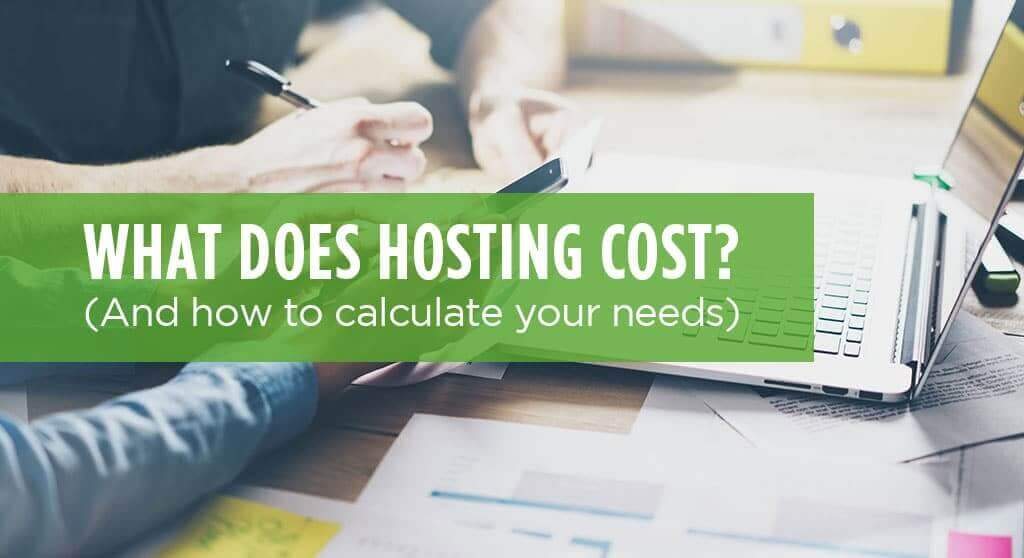
How small to mid-sized businesses can understand their hosting needs.
Web hosting costs are one of the basic maintenance fees most business must account for when they launch their website. However, many businesses find the subject confusing, and aren’t sure what they should be paying for web hosting, or what services their web hosting should include.
Web hosting has evolved significantly over the years. Back in the day, may businesses expected to host their website themselves, and did so out of servers in their office. However, current web hosting options are much more host efficient and secure than older ones. If you haven’t thought about your hosting arrangements since you first launched your website in the early 2000’s, it may be time to re-examine your hosting situation.
Kinds of hosting.
Calculating hosting costs boils down to a few basic factors: how much data you need to store on the servers, how much traffic you expect to have on your site per month, and the amount of data each visitor will consume. So a small marketing site with a regular blog will have relatively low storage needs, and even a moderate traffic flow is unlikely to slow them down too much. On the other hand, a video streaming service requires significantly more storage, and each visitor will consume more bandwidth.
To understand your hosting needs, it’s first important to understand that there are different types of hosting services. Your choice of service will have an impact on your ultimate hosting costs.
Shared Server.
A shared server is the cheapest option. This is when server resources are split between a number of clients so that each only has to pay for a fraction of the total hosting cost. Shared servers are acceptable for individuals are fledgling companies, but small businesses will quickly outgrow them. Shared servers also require a system administrator to manage the various users. Furthermore, because users share the same resources, they are a less flexible option for some.
Virtual Private Server (VPS).
A VPS is a great option for small to mid-sized businesses. Essentially, VPSs partition servers to create an environment equivalent to dedicated servers, but at a fraction of the cost. VPSs have limited processor time, RAM, and disk space. However, they offer more flexibility than shared servers, and can be run using whatever OS the user wants to install.
Dedicated Server.
Dedicated servers offer the most control and resources to users, but are also the most expensive. In fact, for most small businesses, these are probably overkill. However, for ecommerce businesses, those with a large membership program, or ones that experience a high volume of traffic a month, this may be the only viable option.
What should you expect from your web hosts?
A quality web hosting service provides more than just server space and bandwidth. They’re also responsible for making sure those resources are available with minimal downtime.
This means they provide multiple backups of your website so that nothing is lost, even if something happens to the server where your website is stored. They should also have backup hardware on hand so that if a server does go down, they can quickly replace it.
Finally, your web host should have top-level security precautions in place, both virtually and physically. Web hosting companies should employ physical security measures at their data centers to protect the servers from physical tampering, and they should have top-level digital security measures in place to safeguard the sensitive information of your business and your customers.
What if I want to host my site myself?
Hosting your own website is a bad idea. Not only is traffic on your website restricted by your bandwidth, but you are not likely to have the same resources that a dedicating web hosting business.
Web hosting companies don’t just provide server space. They also run regular backups of your website, employ high-level security to protect their servers from external threats, and maintain top-level hardware to reduce downtime for businesses.
Without these resources, your website is at risk—and with it, your business. If you store valuable data on your server—such as company secrets or customer information—that data is more likely to be lost or stolen. And unless you regularly backup that data and have new servers ready to replace your current hardware at a moment’s notice, you could lose your data if anything happens to your server.
Web hosting is included with our service package.
We’ve worked with business enough to understand that many of them don’t want to be bothered with making decisions about web hosting. They would rather leave this in the hand of their web developers. Honestly, we’re fine with that.
We have a trusted web hosting partner that allows us to bundle hosting in with maintenance and other services starting at $100. For clients with more complex needs, as in the case of ecommerce, we may use a dedicated server or larger VPS which ranges from $150 to $300+. This takes a major concern off our clients’ plate and helps them budget for hosting as one of their regular operational expenses.
So, if you’re a small business with only a moderate amount of traffic, your hosting cost shouldn’t be much more than $100/mo. If you’re a large business with a lot of traffic and significant bandwidth needs, you should expect much more than that. If you’re still confused about your needs, we’re always happy to discuss this with our clients and can make a recommendation for you based on your web project.






